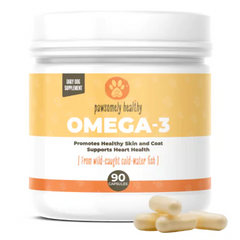
The Best Dog Food for Allergies According to a Nutritionist
Share
Dog allergies can be caused by everything from fleas to pollen to down, and they can cause our dogs pain and distress. In addition to other steps like removing the allergens as best we can, we can change our dog’s diet to support their body and help them heal. The best dog food for allergies will be made with real ingredients and minimally processed. Fortunately, pet parents now have kibble, cooked, and raw options that meet those requirements. 5 minute read
Allergies can make our dogs miserable, and pet parents can be at a loss as to how to help. We reached out to Hannah Zulueta, a Certified Canine Nutritionist, to ask her all our questions about what causes our dogs’ allergies. She shares how we can help and what is the best dog food for allergies.

Why Do Dogs Get Allergies?
Dogs get allergies because their body has an unnecessary or elevated response to a substance. Their immune system reacts to the substance as if it’s harmful, even though it isn’t. This is essentially the same reason why people get allergies. However, with dogs, it may be harder to determine their level of discomfort since they can’t explain it to us. So it’s important, as pet parents, to know what to look for to determine if our dogs have allergies. It’s also important to understand the kinds of things that our dogs are allergic to.

What Kinds of Things Are Dogs Allergic to?
Unfortunately, there are a lot of things out there that can cause an allergic reaction in our pups. Here are some of the most common allergens.
1. Things That Bite Them
Fleas, ticks, bees, and insect bites can trigger a rash or itch. While many dogs will have a reaction, your dog’s reactivity may be strong. You may notice swelling and redness across the area.
2. Things That Irritate Them on Contact
This can be inside or outside the home. Outside the home, grass and pollen are the usual suspects. Inside the home, it could be dust mites, which can live in mattresses, furniture, carpets, or curtains. Other culprits include cleaning solutions or laundry chemicals, like your fabric softener. Dogs can also be allergic to down. So the down in your comforter could be a trigger, especially if your dog sleeps on your bed.
3. Things That They Eat
This is the least common trigger, although this is the first one blamed almost all of the time. There are dogs with intolerances to food like chicken or shellfish, but a true allergic response is very rare. The difference between food intolerances and allergies is that intolerances only affect the digestive system, while allergies affect the immune system. Both can cause you and your dog distress, but while intolerances are troublesome, allergies can be life-threatening.
What Are Some Signs Your Dog Has Allergies?
The skin is the biggest detox organ, so you’ll often see the skin exhibit symptoms when your dog has an allergic reaction. These can include:- Flushed skin, belly, or muzzle
- Broken skin from itching
- Hot spots
- Rashes
- Bumps

If the reaction is accompanied by a yeast infection, you’ll often see the eyes become weepy. Your dog might even have rusty, smelly tear stains. Check their paws as well, since they can be red and inflamed and might even be smelly.
In bad cases, dogs will lose fur from itching so much. In very severe cases, their skin may even become leathery and thick in the areas they lost fur.
What’s the Best Way to Treat Your Dog’s Allergies?
Seeing your dog suffer from allergies can be heartbreaking, but fortunately, there are things you can do to help.
1. Remove Known Triggers
Most people know about treatments for fleas and ticks, but you can eliminate or limit other allergens as well. For example, if your dog has a dust mite allergy, things like using allergen-proof mattress covers and regular vacuuming with a HEPA-filtered vacuum cleaner can help.
2. Keep the Skin Clean
Water rinses go a long way, especially if it’s a pollen allergy. After all, if you rinse the allergen away, it can’t cause a reaction!
And pollen doesn’t have to be pollen from flowers - more often it’s pollen from grass and trees.
3. Shampoo as Needed
Depending on your pup’s rash, topical treatment with shampoo can help relieve the itch, dry out rashes, and strengthen the skin barrier. However, not any shampoo will do. It should be formulated for dogs, and preferably medicated specifically for dogs with skin issues.
4. Clean Up Their Diet
If you can switch from kibble to cooked food, do so. Kibble is harder to digest. By feeding your pup a diet that’s easier for the body, it gives them more support. That’s because their body won’t have to spend all its resources digesting and, instead, can spend more resources healing the gut as well as fighting off external triggers.
5. Support Your Dog’s Immune System Through Supplements
I prefer omega-3 supplements coupled with mushroom supplements. Both of these will lower inflammation while supporting a healthy immune response. A high-quality omega-3 supplement will provide the long-chain omega-3s that have extended health benefits, such as anti-inflammatory properties, and not the short-chain omega-3s that just provide energy.
You should also look for omega-3 fish oil supplements that are made from small fatty fish like sardines or anchovies, not larger fish like tuna or sea bass. Because they have shorter lifespans and are lower in the food chain, small fatty fish have less buildup of toxic heavy metals in them.
Anchovies in Pawsomely Healthy’s Omega-3 fish oil supplement ticks all these boxes and more and is held to the highest standards of quality, which is why it’s a great choice for pet parents looking for an omega-3 supplement to help their dog’s allergies. The anti-inflammatory properties of omega-3s will help calm the immune response that allergens trigger.
What’s the Best Food for Dogs With Allergies and Why?
A limited ingredient diet is best for dogs with allergies because we are feeding them food with more life force and fewer chemicals. Fortunately, today you can find limited ingredient diets in all forms. Each of the manufacturers listed below provides diets that are very simple yet nutrient-dense and have hardly any (if any at all) synthetic vitamin packs. You’ll notice I’ve listed an option for kibble. That’s right - you don’t HAVE to go raw or cooked if you can’t.
The most important thing is to keep the focus on buying real food with real ingredients and minimal processing. That way the body doesn’t have to spend its resources digesting and can focus instead on healing and becoming stronger.
1. Best Kibble for Dogs With Allergies
Carna4 has formulations made from whole foods. That means no meat meals - just real meat. Their foods are quick-baked and air-dried so your pup gets healthy whole foods, and you get the convenience of kibble.
2. Best Cooked Food for Dogs With Allergies
Raised Right is a brand I love for cooked food. This family-owned company provides human-grade pet food cooked at a low temperature to kill off pathogens while still retaining moisture and nutrition for your dog.
3. Best Raw Food for Dogs With Allergies
For raw food, I recommend Smallbatch. They have frozen-raw and freeze-dried options available, and their ingredients are humanely and organically sourced. How Can a Supplement Help Your Dog’s Allergies?A supplement like omega-3 can help lower inflammation, which is part of the body’s immune response. Fish is one of the most omega-3-rich foods, but it’s very hard to source. If you don’t have access to fresh fish that is responsibly caught, you’re better off feeding your pup a supplement like Pawsomely Healthy’s Omega-3.
Even for those pup parents that have access to fresh fish, I’d still recommend an omega-3 supplement. Fish can get expensive and you’ll get more omega from a supplement. It doesn’t have to be one or the other - you can feed both fresh fish and also add in a high-quality omega-3 supplement to support your dog so they have a better response to allergy triggers.

The Final Woof
Allergies can be frustrating for pet parents and miserable for our pups, but help is available! Removing known triggers, keeping their skin clean, and providing internal support through omega-3 supplements and a diet made primarily of a nutrient-rich, minimally processed dog food for allergies will have your dog living their best life.
Hannah Zulueta is a Certified Canine Nutritionist and can be found online at Daily Dog Food Recipes or on Instagram.

